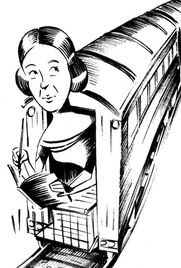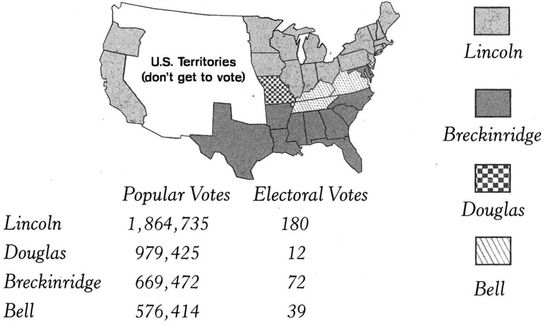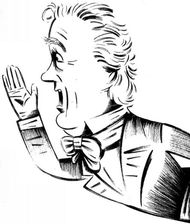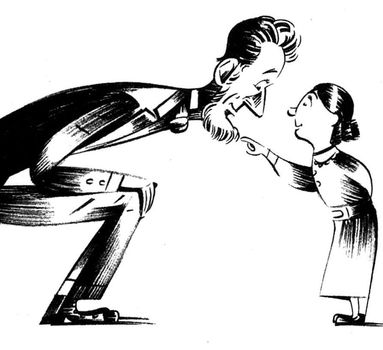Two Miserable Presidents (5 page)
Read Two Miserable Presidents Online
Authors: Steve Sheinkin

Mary Chesnut was on a train in South Carolina. It was the day after the election of 1860, and everyone was dying to know who had won.
Mary's brother tapped her on the shoulder and said, “Lincoln's elected.”
“How do you know?” she asked.
“The man over there has a telegram,” he said.
Suddenly the train was filled with talking and shouting, with anger and declarations of Southern pride. Mary Chesnut began keeping a detailed journalâshe knew she was about to witness history.

W
hen he found out he had been elected president of the United States, Abraham Lincoln calmly walked home from the telegraph office and told his wife, “Mary, we're elected.” The streets of Springfield were filled with cheers and music, but Lincoln didn't feel much like celebrating. He was about to face the most difficult presidency in American history. And he knew it.
hen he found out he had been elected president of the United States, Abraham Lincoln calmly walked home from the telegraph office and told his wife, “Mary, we're elected.” The streets of Springfield were filled with cheers and music, but Lincoln didn't feel much like celebrating. He was about to face the most difficult presidency in American history. And he knew it.
The election results help explain Lincoln's worries:

As you can see on the map, Lincoln got all his support from the North and West. He did not win a single Southern state. In fact, in ten Southern states Lincoln did not even get a single vote! .
White Southerners saw their worst fears coming true. They knew that the North's population was growing more quickly than the South's. And now they knew that the North could elect a president without any support from Southern voters. Leaders of several Southern states began talking about seceding, or officially withdrawing, from the United States. One Georgia man saw it like this: “We are
either slaves in the Union or free men out of it.”
either slaves in the Union or free men out of it.”
How would you like to be president at a moment like this?
T
he man who had the job, James Buchanan, couldn't wait to go home. Buchanan still had four months to go until Lincoln took over. Pretty sure the country wouldn't last that long, he often cried out:
he man who had the job, James Buchanan, couldn't wait to go home. Buchanan still had four months to go until Lincoln took over. Pretty sure the country wouldn't last that long, he often cried out:
“I am the last president of the United States!”
Buchanan had good reason to worry. On December 20, South Carolina seceded from the United States. Six more states quickly followed: Mississippi, Florida, Alabama, Georgia, Louisiana, and Texas. Leaders from these seven states met in Montgomery, Alabama, to form their own government and write their own constitution. They decided to call themselves the Confederate States of America.
James Buchanan

On February 10, 1861, Jefferson Davis and his wife, Varina, were cutting roses in the garden of their Mississippi plantation. Jefferson
Davis was expecting big newsâand dreading it.
Davis was expecting big newsâand dreading it.
When Mississippi seceded from the Union, Davis had resigned from the United States Senate and traveled home. Now he was trying to enjoy a few quiet days on his Mississippi plantation. This was a man badly in need of a vacation. He was exhausted from years in politics. And he suffered from a nerve disease that caused unbearable headaches, making it feel as if the bones of his face were grinding together.
But Davis knew that the new Confederate government was meeting in Alabama. And he suspected they might give him a very important jobâmaybe commander of the army, or possibly even president. “I would prefer not to have either place,” he said.
So Jefferson was worried when a messenger rode up with a telegram. And his face twisted with pain as he read the words. Varina thought someone in the family had died, until he read her the telegram:
“Sir: We are directed to inform you that you are this day unanimously elected President of the Provisional Government of the Confederate States of America, and to request you to come to Montgomery immediately.”
Varina said her husband spoke of the news “as a man might speak of a sentence of death.” Davis had been chosen, though, and he intended to do the job. “I will do my best,” he told her. Huge crowds cheered Davis's train as he traveled to Montgomery. He went to work in an office with “The President” written on a piece of paper and tacked onto the door.

“The South is determined to maintain her position,” Davis declared, “and make all who oppose her smell Southern powder.” Gunpowder, that is. Peace was still possibleâon one condition. “All we ask is to be let alone,” Davis said.
But was there really any chance that the Confederate states would be “let alone”? Would the United States government allow seven states to simply break away from the country without a fight?
What do you say, Mr. Lincoln?
L
incoln couldn't answer this question yet. He was still in Springfield, helplessly watching the country fall apart. He spent his days surrounded by an endless stream of visitors. Some came to meet him or interview him. Some came to ask for high-paying government jobs. Lincoln said his face hurt from smiling so much. “I am sick of office-holding already,” he said, long before actually taking office.
incoln couldn't answer this question yet. He was still in Springfield, helplessly watching the country fall apart. He spent his days surrounded by an endless stream of visitors. Some came to meet him or interview him. Some came to ask for high-paying government jobs. Lincoln said his face hurt from smiling so much. “I am sick of office-holding already,” he said, long before actually taking office.
It was during this tense and annoying time that Lincoln made a major change in his appearance. Before the election, an eleven-year-old girl from Westfield, New York, named Grace Bedell had written to Lincoln, saying, “My father is going to vote for you, and if I was a man I would vote for you too.” She promised to try to convince her brothers to vote for Lincolnâbut she felt his chances of winning would be better if he grew a beard. “If you will let your whiskers grow,” she wrote, “I will try and get the rest of them to vote for you. You would look a great deal better, for your face is so thin.”
Lincoln agreed that his face could use some improvement (actually,
he felt he was one of the ugliest men he had ever seen). And he began growing that famous beard that everyone pictures when they think of Abraham Lincoln.
he felt he was one of the ugliest men he had ever seen). And he began growing that famous beard that everyone pictures when they think of Abraham Lincoln.
In February the Lincoln family packed up their stuff. Lincoln wrote his new address on each trunk: “A. Lincoln, The White House, Washington, D.C.” On the way to Washington, Lincoln stopped to make speeches in dozens of townsâincluding Westfield, New York. “I have a correspondent in this place,” Lincoln told the crowd in Westfield. “If she is present I would like to see her.”
“Who is it?” the people shouted. “Give us the name.”
“Her name is Grace Bedell,” Lincoln said. “She wrote me that she thought I would be better looking if I wore whiskers.”
Grace walked up to the stage to meet the next president. Lincoln bent down and said, “You see, I let these whiskers grow for you, Grace.” He gave her a kiss, and the people cheered.

The rest of Lincoln's trip to Washington was not as fun. He kept hearing rumors that assassins were going to murder him when he stopped to make a speech in Baltimore. So he decided to skip the Baltimore visit. With a heavily armed friend sitting beside him, Lincoln tried to sleep as his train sped through the night toward Washington. When he arrived at six in the morning, there were no crowds there to greet himâno one knew he was about to show up. He stepped off the train and went to a hotel for breakfast.
Newspapers made fun of Lincoln's arrival, laughing at the idea of a president sneaking into Washington. Cartoons even showed Lincoln traveling in ridiculous disguisesâin some drawings he wore clothes borrowed from his wife. Lincoln wasn't even president yet, and he was off to an awful start.
L
incoln finally became president on March 4, 1861. Rumors of a planned assassination were still swirling, so the inauguration ceremony outside the Capitol Building was a bit tense. Everything went fine, though, except for one scary moment when a man fell loudly from a nearby tree. He wasn't up there to shoot anyone, thoughâhe just wanted a good view of the ceremony.
incoln finally became president on March 4, 1861. Rumors of a planned assassination were still swirling, so the inauguration ceremony outside the Capitol Building was a bit tense. Everything went fine, though, except for one scary moment when a man fell loudly from a nearby tree. He wasn't up there to shoot anyone, thoughâhe just wanted a good view of the ceremony.
The whole country was eager to hear Lincoln's inaugural speech. Seven Southern states had already left the Union and several more were thinking about seceding.
Lincoln made his opinion clear: individual states did not have the right to secede from the United States. If people were unhappy with recent events in the country, they were free to try to make new laws or even amend the Constitution. But as president, Lincoln said, it was his job to protect the Union. He urged the states that had seceded to come back before it was too late: “In your hands, my dissatisfied fellow-countrymen, and not in mine, is the momentous issue of civil war. The government will not assail you. You can have no conflict, without being yourselves the aggressors.”
Lincoln was basically warning the Southern states: Don't do anything you might regret. He didn't talk directly about the crisis brewing at Fort Sumter in South Carolina. But he was thinking about it, and so was everyone else. If there was going to be a civil war, it was probably going to start there. And soon.
Other books
Out of the Dark (The Brethren Series) by Reinke, Sara
DX by Carolyn Jewel
Ghostman by Roger Hobbs
The Dark Stranger: A Sharon Brown Erotic Romance by Robertson, Kathleen
Spanked by an Angel [Notorious Nephilim 1] (Siren Publishing Ménage Amour) by Carolyn Rosewood
Varian Krylov by Hurt
Beloved Enemy by Ellen Jones
She Is Risen (She Is Risen: The Gun Control Case Studies) by Adams Irish, Travis
Bedroom Eyes by Hailey North
Julia’s Kitchen by Brenda A. Ferber